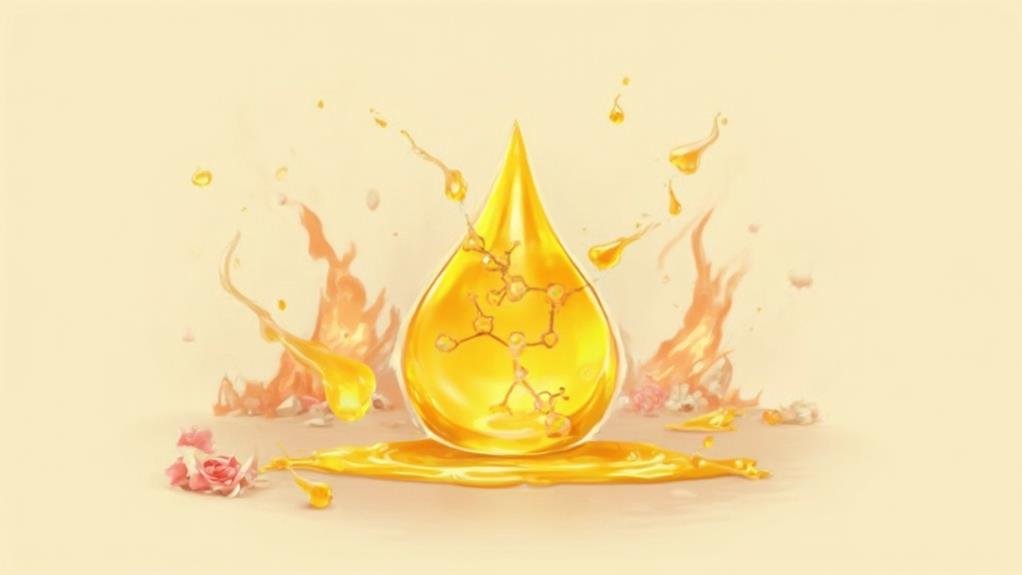Are Essential Oils Flammable?
Yes, essential oils are flammable. This is because they contain high concentrations of volatile organic compounds (VOCs) such as terpenes, esters, and aldehydes.
These compounds can easily ignite when exposed to heat or sparks, making safe storage and handling crucial.
Understanding Essential Oil Composition

Essential oils are complex mixtures of organic compounds that give them their unique characteristics, including aroma, color, and viscosity. You might find it useful to explore how essential oils differ from fatty oils, as this can provide further insights into their unique properties.
These compounds also play a significant role in their flammability.
Key Components of Essential Oils:
- Terpenes: The most abundant compounds, categorized into monoterpenes, sesquiterpenes, and diterpenes. Many terpenes, like limonene and pinene, are highly flammable.
- Esters: Formed from an acid and an alcohol, contributing to fruity and floral notes. Some esters can also contribute to flammability.
- Aldehydes: Contain a carbonyl group, influencing aroma and bioactivity. Certain aldehydes increase the flammability of essential oils.
- Ketones: Contain a carbonyl group linked to two hydrocarbon chains, impacting aroma and bioactivity.
Why are Essential Oils Flammable?
The flammability of essential oils is primarily due to the presence of VOCs. These compounds evaporate easily at room temperature, creating vapor that can ignite when exposed to a heat source.
Oils with higher concentrations of certain VOCs, particularly terpenes and aldehydes, are more likely to be flammable. For advice on safety, consider how essential oils interact with surfaces like wood, as explained in essential oils stain wood.
Essential Oils with Higher Flammability
- Citrus-based oils (lemon, orange, grapefruit)
- Pine and fir oils
- Cinnamon oil (high in cinnamaldehyde)
- Clove oil (high in eugenol)
- Tea tree oil (high in cineole)
It’s crucial to store these oils properly and follow recommended usage guidelines to minimize the risk of fire.
Factors Contributing to Ignition Risk

Several factors can increase the risk of essential oils igniting:
- Concentration: Higher concentrations of essential oils increase the risk of ignition. Always dilute essential oils in carrier oils like almond oil or coconut oil according to manufacturer guidelines. This reduces the concentration of flammable compounds.
- Oxygen Presence: A well-ventilated area or exposure to pure oxygen increases the flammability of essential oils. Be cautious of nearby air movement sources like fans or AC vents.
- Surface Area: Spills over larger surface areas increase the risk. Small spills on large surfaces evaporate quickly, creating a flammable atmosphere. Always use tightly sealed containers to prevent spills.
- Heat and Sparks: Essential oils can ignite when exposed to heat sources or sparks. Ignition temperatures vary depending on the oil’s composition, but common heat sources to avoid include:
- Candles
- Cigarettes
- Electrical appliances
- Stoves
Physical properties like viscosity and surface tension can also affect flammability. For example, lavender oil has low viscosity, making it prone to splashing and spreading, which can increase the risk of ignition.
Safe Storage and Handling of Essential Oils
Storage Guidelines
- Use dark-tinted glass bottles with tight-fitting lids to protect the oils from light and air.
- Store in a cool, dry place away from sunlight and heat.
- Clearly label bottles with the oil’s name, concentration, and safety warnings.
Handling Precautions
- Wear protective gloves and eyewear when handling essential oils to avoid skin and eye irritation.
- Use a stable surface when pouring or measuring oils to prevent spills.
- Avoid over-tightening lids, which can damage the bottle or cause leaks.
- Regularly inspect storage areas for leaks or other hazards.
Risks of Open Flames and Candles

Open flames can easily ignite essential oil vapors, especially those with low flash points like tea tree or lavender oil. Good ventilation is crucial to prevent vapor buildup.
Precautions when using essential oils near open flames:
- Keep essential oils a safe distance away from any heat source.
- Avoid using essential oils in poorly ventilated areas.
- Be aware of oils with particularly low flash points.
Guidelines for Aromatherapy and Diffusers
When using aromatherapy and diffusers:
- Carefully read and follow the manufacturer’s instructions.
- Use the correct amount of essential oils as recommended.
- Position diffusers away from children, pets, and open flames.
- Avoid placing diffusers near heating vents or radiators.
- Place diffusers on stable surfaces to prevent accidental tipping.
- Consider potential skin irritation or allergic reactions when selecting oils. Always dilute essential oils in carrier oils and perform a patch test before widespread use.
Electrical Appliance Safety with Essential Oils
When using electrical appliances with essential oils:
- Ensure the appliances are specifically designed for aromatherapy use.
- Check for certifications from reputable testing organizations.
- Consider the flash point and ignition temperature of the oils you are using.
- Never leave appliances unattended while in use.
- Follow the manufacturer’s guidelines for usage and maintenance.
- Regularly inspect appliances for any signs of wear and tear.
What to Do in Case of an Essential Oil Fire
Preparation
- Keep a Class B fire extinguisher readily available in the area where you store or use essential oils.
- Familiarize yourself with how to operate the fire extinguisher properly.
In Case of Fire
- Evacuate the area immediately.
- Call emergency services.
- If it is safe to do so, use the fire extinguisher to attempt to extinguish the fire.
Important: Never use water to extinguish an essential oil fire, as this can cause the fire to spread.
Responsible Essential Oil Use Practices
- Always work in well-ventilated areas away from any heat sources.
- Store oils in a cool, dark place.
- Keep essential oils out of reach of children and pets.
- Use airtight containers to prevent leaks and spills.
- Follow the manufacturer’s guidelines for all aromatherapy applications.
- Regularly inspect essential oils for any signs of degradation.
By understanding the flammability risks of essential oils and adopting responsible use practices, you can safely enjoy the many benefits they offer.







